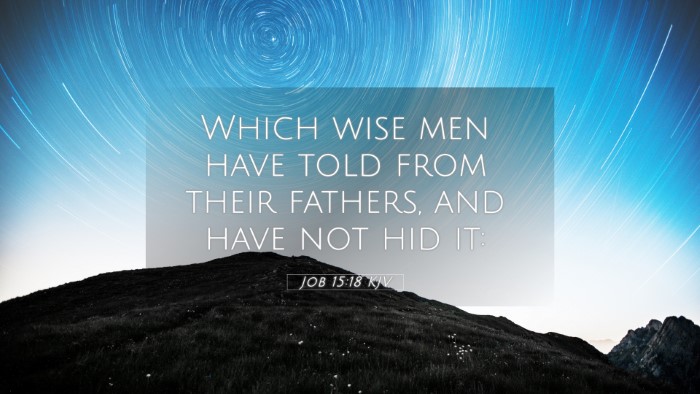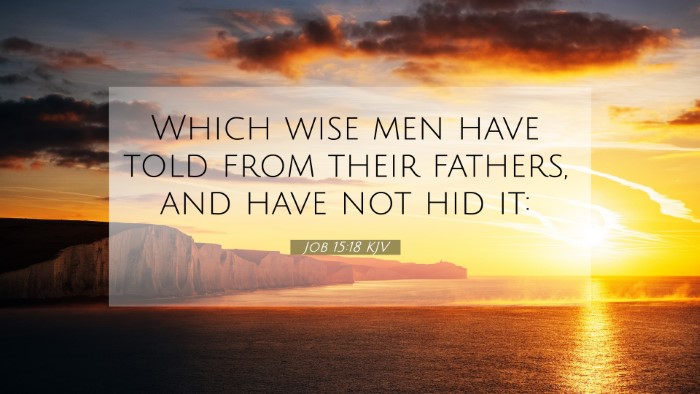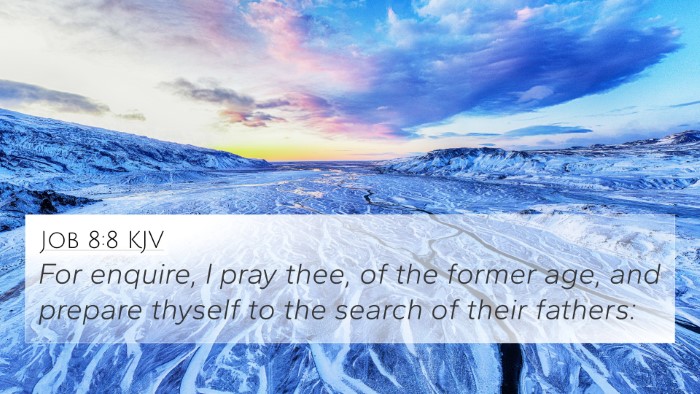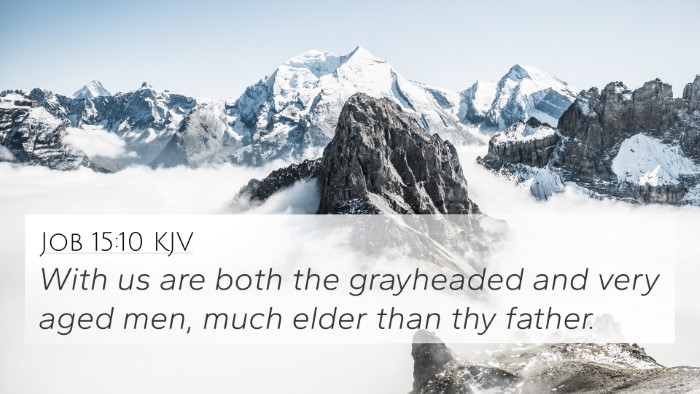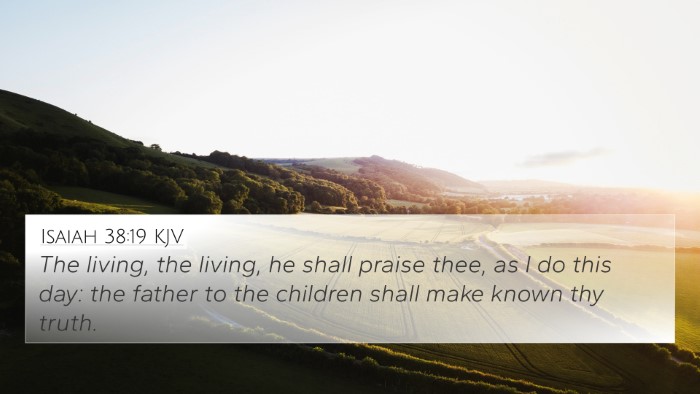Understanding Job 15:18
Job 15:18 states, "Which wise men have told from their fathers, and have not hid it." This verse forms a part of Eliphaz's response to Job, wherein he emphasizes the tradition of wisdom handed down from previous generations.
Summary of Key Insights
This verse, while seemingly straightforward, invites deeper contemplation about the source of wisdom, the nature of human understanding, and the value of ancestral knowledge. The concept highlights the interconnectedness of biblical teachings, urging us to consider the larger narrative found throughout Scripture.
Eliphaz's Context
In this passage, Eliphaz represents a common theme in Job's discourse: the perceived understanding of suffering and divine justice. Drawing from various public domain commentaries, we can derive multiple layers of meaning:
- Matthew Henry: He emphasizes that Eliphaz believes wisdom is not self-derived but comes from the collective experience and teachings of wise men from the past. This elicits the importance of tradition in seeking understanding.
- Albert Barnes: Barnes indicates that the reference to wisdom passed down signifies the value of shared human experience in interpreting life’s trials. He posits that reliance on established wisdom may often overshadow personal revelations.
- Adam Clarke: Clarke notes that the wise men Eliphaz refers to are those who fear God and have solid experiential knowledge. His argument is that mere tradition is insufficient without the context of godliness and righteousness.
Cross-References
To comprehend Job 15:18 within the broader biblical context, we can look at cross-references that elucidate similar themes of wisdom, tradition, and understanding:
- Job 12:12: "With the ancient is wisdom; and in length of days understanding." This verse underscores that wisdom often accompanies age and experience.
- Proverbs 1:5: "A wise man will hear, and will increase learning; and a man of understanding shall attain unto wise counsels." Here, the pursuit of wisdom is highlighted and signals the importance of listening to seasoned voices.
- Proverbs 22:28: "Remove not the ancient landmark, which thy fathers have set." This admonition stresses the importance of cherishing traditions and the wisdom that comes from them.
- 1 Corinthians 1:20: "Where is the wise? Where is the scribe? Where is the disputer of this world? hath not God made foolish the wisdom of this world?" This contrasts earthly wisdom with that of God, reinforcing the notion that divine wisdom transcends human understanding.
- Psalms 78:5: "For he established a testimony in Jacob, and appointed a law in Israel, which he commanded our fathers, that they should make them known to their children." This verse connects the generational transfer of divine teachings and wisdom.
- Isaiah 19:11: "Surely the princes of Zoan are fools, the counsel of the wise counselors of Pharaoh is become brutish: how say ye unto Pharaoh, I am the son of the wise, the son of ancient kings?" This critiques those who boast of worldly wisdom without true understanding.
- Job 8:8-10: "For inquire, I pray thee, of the former age, and prepare thyself to the search of their fathers… Shall not they teach thee, and tell thee, and utter words out of their heart?" This reflects a similar theme of turning to the past for wisdom and insights.
Thematic Connections
Exploring these cross-references provides valuable thematic Bible verse connections, linking Job’s plight with broader biblical insights:
- Both Job and the Proverbs stress the importance of leveraging ancestral knowledge to navigate life's storms.
- The contrast between worldly wisdom and divine wisdom as discussed in the New Testament relates back to Job’s situation, emphasizing faith amidst suffering.
- The call to recognize both the wisdom within life experiences and the guiding principles found in Scripture resonates throughout the Bible.
Implications for Understanding Suffering
Job's discourse raises pivotal questions regarding the interpretation of suffering within a faith context:
- How do we discern wisdom in trials? Job’s friends suggest traditional wisdom, but Job seeks personal understanding and revelation.
- What does it mean to embrace wisdom that is passed down? It involves both respecting the past while also seeking personal relationship with God.
- How can we apply these lessons in modern contexts? The insights from Job drive home the need for active faith amidst the challenges of life.
Conclusion
Job 15:18 enriches our understanding of the nature of wisdom and its transmission across generations. It encourages a dialogue between scriptural cross-referencing and the individual's personal journey of faith. The interplay between tradition and personal enlightenment remains a focus as we apply these lessons to contemporary life.
Through comparative Bible verse analysis, we can find not only connections within Job's narrative but also thematic explorations that resonate throughout both the Old and New Testaments. By utilizing tools for Bible cross-referencing, believers can cultivate a deeper understanding of their faith and the timeless wisdom of Scripture.

